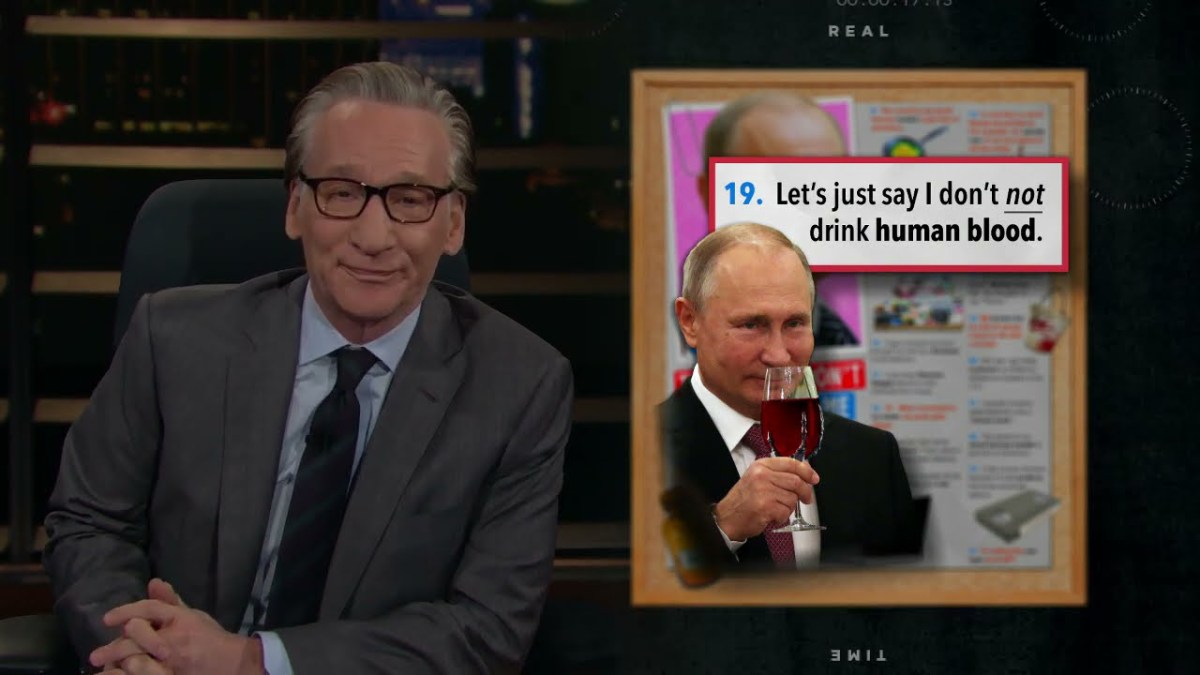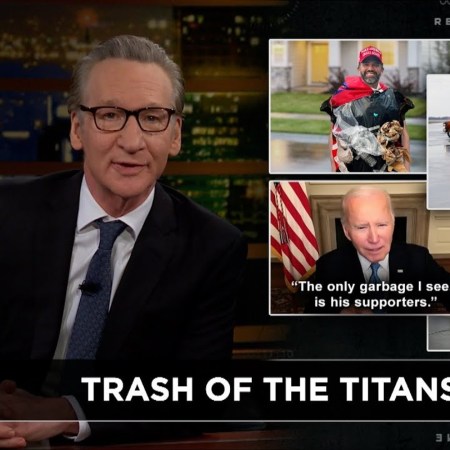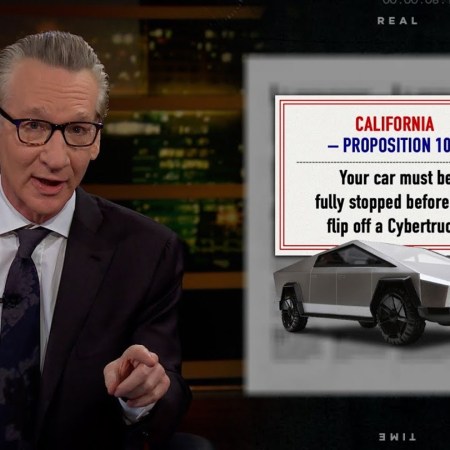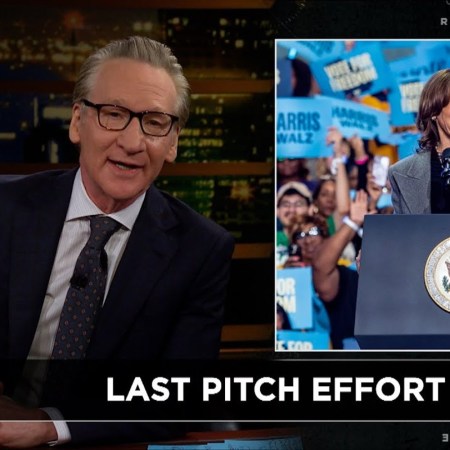Last week, the 20th season of Real Time With Bill Maher kicked off with guest Bari Weiss controversially declaring herself “over with” the pandemic. That debate loomed large over the latest episode, with Maher discussing the matter further with his guests and expanding on his own feelings on how the government should and shouldn’t respond to the pandemic.
But Maher’s opening monologue headed into slightly different territory. Specifically, Maher opened with a riff on cryptocurrency’s turbulent week. Not surprisingly, Maher isn’t a fan of it, given its environmental effects. That it also allowed him to get in a dig at millennials seemed like an added bonus.
He pivoted from there to a discussion of the week in candy. “Don’t get me started on M&Ms,” Maher said. “I’ve realized how much I didn’t know about M&Ms until this week.” By his own admission, Maher had not followed the legion of ad campaigns that preceded this week’s announced reinvention of the characters. It led to one of the funnier moments of the episode, as Maher seemed genuinely bewildered by the concept of “sexy” M&Ms. “Is this really the biggest thing we have to worry about?” he asked.
From there, Maher segued to a riff on the ongoing conflict between Russia and Ukraine. And while there was a much more substantive conversation about this later in this episode, at this stage in the episode it just led to an awful punchline about transgender athletes.
Thankfully, the remainder of the monologue managed to be funny rather than cringe-inducing. It included riffs on the bridge that fell in Pittsburgh before President Biden visited the city, and Maher mocking the faux-anger of a Republican member of Congress critical of Biden’s hot-mic dismissal of a Fox News reporter.
The evening’s first guest was Ira Glasser, the onetime head of the ACLU and the subject of the documentary Mighty Ira. Maher referred to him as one of his heroes, and his admiration for the man was clear throughout. For his part, Glasser was critical of the policies the organization adopted a few years ago regarding case selection. “Most of the speech we defended didn’t reflect our values,” Glasser said, regarding his time at the ACLU. “That was the point.”
That, in turn, led to a more detailed conversation on free speech. “Everybody has an exception” to it, Glasser pointed out. “It doesn’t work if there are exceptions,” Maher said. But while Glasser seemed less than thrilled by some aspects of the current ACLU, he stopped short of a fiery critique of the organization he once headed.
Maher brought up a quote from the ACLU’s current director, Anthony Romero, and asked Glasser for his reaction. “Organizations have the right to change,” Glasser said, “but the problem is — there isn’t any other ACLU.” He went on to express concern over the government getting to determine what you can or can’t say, and cited Rudy Giuliani’s time as mayor of New York as an example. “We filed more First Amendment lawsuits against Rudy Giuliani than any mayor in the history of New York.”
Fiona Hill, author of There Is Nothing For You Here and a recent op-ed on the situation in Ukraine, and Matt Welch of Reason and its podcast, joined Maher for the panel discussion. Maher began by addressing criticism of him for last week’s comments on COVID. “I’m in good company if I’m crazy,” he said, citing Pennsylvania Governor Tom Wolf’s recent comments on pandemic fatigue.
“Why can’t we protect the people who are particularly vulnerable and let society come back?” Maher asked. Hill’s response linked up with something Maher had brought up earlier, which is to say the increased partisan reaction to the pandemic. Hill shared an anecdote about a Wisconsin resident who declared that they wouldn’t get vaccinated for a simple reason: they were a Republican. Welch sought a middle path — hailing Democrats for getting vaccinated and Republicans for keeping schools open.
Both Welch and Hill spoke about the possibility of removing regulations after Omicron dropped — and it was here that Maher pointed out that there would almost certainly be another variant, and another, and another. This was at the center of his argument: waiting for COVID to subside might keep us all waiting for a long time. Is there something more we could do? Unfortunately, there was little the trio could invoke as a path forward on which they all agreed.
The current standoff with Russia prompted Maher to ask why NATO had endured after the end of the Cold War, with both Hill and Welch discussing the reasons why many Eastern European nations sought to join NATO after the fall of the Soviet Union.
From there, the panel shifted gears to partisan divisions in the United States. Hill has theorized that the US is less in a civil war than a cold war, akin to the Troubles. She shared her experiences of growing up during it, and the mood of paranoia that was felt acutely over the course of decades. “We’d look at someone, and we’d immediately get suspicious about — are they on the other side?” Hill said.
Glasser joined the panel for Overtime, which largely consisted of stories about childhood and parenting. One got the impression that Maher, Welch and Hill would have been fine to hear Glasser’s stories of growing up in mid-century Brooklyn; the man is a talented raconteur.
New Rules opened with riffs on Barry Bonds (Maher thinks he should be in the Hall of Fame) and a cafe that lets you experience being born. For the bulk of the segment, he addressed a Fox News commentator arguing that Maher should be the next Democratic nominee for President.
It allowed Maher a moment to articulate just where he is, politically speaking. “It’s not me who’s changed — it’s the Left.” he said. “The oath of office I took was to comedy, and if you do goofy sh*t, wherever you are on the spectrum, I’m going to make fun of you.”
Here’s what was frustrating about the segment: it followed the pattern of many of Maher’s critiques, where he began by critiquing elected Democrats (some DAs, some members of Congress), but eventually moved on to things that elected officials have nothing to do with, like the existence of a pregnant man emoji and all things Mr. Potato Head. It begs the question: is Maher angry at the Democratic Party, or at the current state of left-of-center thought in the country? There’s certainly overlap there, but the two are not one and the same.
When Maher argued that Democrats are focusing on regulating too many things, he struck a few more resonant points. Did Maher bring up his solar shed, a running theme from last season? He did. And the same point has been made by others, including a much-discussed Ezra Klein piece in the New York Times. But that’s where the issue comes up: Maher is, by his own admission, a comedian first, rather than a political writer like Klein. But sometimes, going for the biggest laughs can dilute a point rather than bolster it, and this segment served as a prime example of that.
Thanks for reading InsideHook. Sign up for our daily newsletter and be in the know.


















